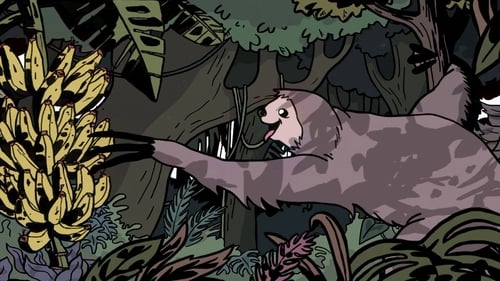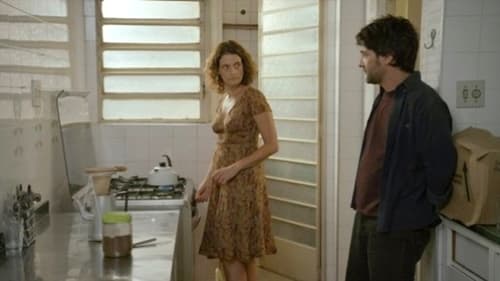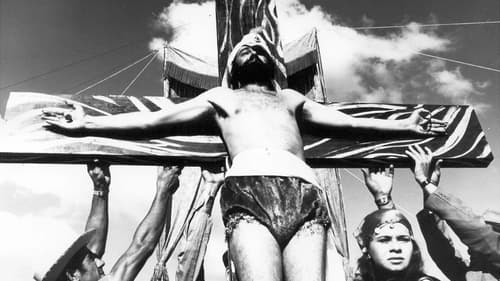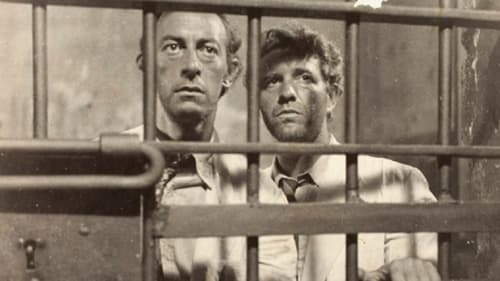Jean-Claude Bernardet
出生 : 1936-08-02, Charleroi, Belgium
略歴
Jean-Claude Bernardet is an actor, director and writer born in Belgium, from a French family. He spent his childhood in Paris and as a 13-year-old departed to Brazil with his family, there he was naturalised Brazilian citizen in 1964.

In 1965, a year after the military coup in Brazil, an oasis of freedom opened in the country's capital. The Brasília Film Festival: a landmark of cultural and political resistance. Its story is that of Brazilian cinema itself.

An intellectual, his questions and contradictions. How to think and act politically these days?

Screenplay
An intellectual, his questions and contradictions. How to think and act politically these days?

Director
An intellectual, his questions and contradictions. How to think and act politically these days?

Luan works as an application bikeboy and faces dilemmas and prejudices in his daily delivery journey in a big city. Without hesitating, he dreams of a better future.

himself
Jorge Bodanzky reaches to his memories of the time he studiet at the University of Brasília to show a look into the 1960s Brazilian youtuh, with its dreams, expectations, crisis and incomplete projects.

A projectionist at a porn cinema in downtown São Paulo, makes his first film in Super8, an essay about the failure of a lifetime. The scenes from the films you watched intersect with the new images they capture, fiction and reality blending together, weaving a bridge between the past and the present.

Self
Letter Beyond the Walls reconstructs the trajectory of HIV and AIDS with a focus on Brazil, through interviews with doctors, activists, patients and other actors, in addition to extensive archival material. From the initial panic to awareness campaigns, passing through the stigma imposed on people living with HIV, the documentary shows how society faced this epidemic in its deadliest phase over more than two decades. With this historical approach as its base, the film looks at the way HIV is viewed in today's society, revealing a picture of persistent misinformation and prejudice, which especially affects Brazil’s most historically vulnerable populations.

Velho

Writer
São Paulo, 1984. Agostinho, an old and tired Physics professor, is married to Januária, a retired school principal. In his classes, he begins to feel attracted to one of his students, Márcia, an HIV positive teenager. Quickly, the attraction of the two turns into an impossible love.

Self (archive footage)
A film director faces a complex situation in the production of his new film: Laerte, the protagonist of the story, begins to renegade her former characters, the Pirates of the Tietê. Lost in this situation and determined to be faithful to his whims after seeing the approach of death, the director decides to tell his drama mixing his persona with the story, creating a chaotic labyrinth between fiction and real life.

Vizinho 1
Gabriel is installed next to a tree in a noble neighborhood of the city of São Paulo. Clarisse accompanies astonished and inert the treatment given to Gabriel, at the same time that leads a stagnant life and dependent of the mother.

Jean feels trapped in the logic of longevity that the pharmaceutical industry imposes on him and decides to plan a conscious suicide. He invites Helena to commit suicide to two. She, on the other hand, hesitates, knows that she will live well even if she needs to live alone, but she helps him in his intentions. The silence between them does not reveal distance, but intimacy. These are years of shared affection. Together, they will prepare all the details for the funeral. He dances death while she continues rehearsing life. In the process, the two realize that before the end, there is still a lifetime.

A 15 year-old boy and his friends want to lose their virginity.

himself
Jean-Claude Bernardet, Brazil’s most important living film critic, is old and sick, but tries to reinvent himself through his long disintegration. Shifting between fiction and documentary, A Destruição de Bernardet uses unusual tools to trigger his memory and to make him tell his story.

Bil is an elderly man who works as an office boy for a firm in São Paulo, as he does not pay for a bus ticket and takes a preferential line at the bank. One day he gets involved in an unusual bank robbery.

Writer
Élvio and Eric live alone in a small apartment without talking to anyone else. The relationship between the two deteriorates until one day, mysteriously, a periscope appears in the room.

Élvio and Eric live alone in a small apartment without talking to anyone else. The relationship between the two deteriorates until one day, mysteriously, a periscope appears in the room.

From the murder of his father by his uncle, Hamlet is forced to confront its own contradictions and the world around him. In a deconstruction of itself, Hamlet delves into the eternal question of the meaning of existence. Set in a large metropolis, Hamlet is a free adaptation of William Shakespeare's tragedy.

Himself
An old man stuck in a wheelchair has a red ball for only distraction. He throws it harder and harder, higher and higher, until it finally slips from his hand, hitting the floor and unleashing the hell…

Henrique is a filmmaker who has made films that hardly anyone saw. A marginal for lack of choice.

Juvenal is a metro driver from Belo Horizonte. Margô, a station controller. Both live in a state of complete solitude – each in a particular way. Juvenal refuses to be alone and strolls through the streets of this metropolis taking comfort by mingling with the anonimous crowd. Margo seeks relief in the virtual world of social networks where she struggles to establish long lasting relations with real persons.

José

Screenplay
Former political activist receives compensation from the Brazilian government for the disappearance of her husband, victim of the repression triggered by the Brazilian military dictatorship. With the money, she can buy her an apartment and free herself from this dreadful condition she lived for decades. At the moment of moving to the new home, however, a visit arises that forces her to review her entire life.

The crossing of generations under the influence of military dictatorship and political openness. Documentary highlights the role of the organizers of the March for the Family with God for Freedom in 1964. Based on stories of life under the military dictatorship, stories and reflections of people who had a significant participation in that period, whether for or against the coup.

Experimental documentary short that debates over Rogério Sganzerla's Brazilian cult classic "The Red Light Bandit".

Jean-Claude
The making of an unfinished film about phobias. Says the director. Behind the screens, he discusses at length (with e.g. Coffin Joe) about the aesthetic boundaries of the project: volunteers under controlled circumstances become immersed in their phobias in order to film the fear on their faces.

Self
Person is a documentary about the life and work of filmmaker Luiz Sérgio Person. The documentary brings the reconstruction of the history of the São Paulo filmmaker through the personal journey of his daughter, Marina. Through interviews with friends, family, and people who worked with Person, she seeks to discover more than dates and biographical data.

Himself
This documentary, produced by the Mazzaropi Institute, shows movie scenes, testimonials of researchers, historians, intellectuals, and popular artists. As a bonus, it shows parts of Mazzaropi's last appearance on TV, on Hebe Camargo Show.

Himself

Director
This program from the Brazilian Historical Panorama series proposes a reflection on the 60s in Brazil based on its audiovisual memory. With excerpts from texts and opinions by Augusto Boal, Lygia Clark and Torquato Neto, among others, scenes from movies and newspaper headlines, the documentary allows the 1960s to speak for itself.

Writer
Selma, a retired nurse, is an extremely loving mother for his son Raimundo, in an almost incestuous relationship. One day, she becomes aware of some changes in her son's behavior. At first, she thinks it may be some girlfriend. But soon she learns it's something else.

Story
Selma, a retired nurse, is an extremely loving mother for his son Raimundo, in an almost incestuous relationship. One day, she becomes aware of some changes in her son's behavior. At first, she thinks it may be some girlfriend. But soon she learns it's something else.

Writer
A woman ready to move away from Brazil is kidnapped by her jealous ex-lover.

A museum worker - the watchman - motivated by the homonymous painting by Giorgio De Chirico, is introduced, through everyday life, into the metaphysical universe of the Italian painter.

Producer
An ode of love and hatred to the city of São Paulo. Composed of fragments of films, it follows characters in their natural habitat: the streets.

Writer
An ode of love and hatred to the city of São Paulo. Composed of fragments of films, it follows characters in their natural habitat: the streets.

Director
An ode of love and hatred to the city of São Paulo. Composed of fragments of films, it follows characters in their natural habitat: the streets.

Production Coordinator
Mixing new images to existing São Paulo movies takes, the documentary presents the city from the perspective of five main attributes: transformation, anonymity, crowd, precariousness and dimension.

Executive Producer
Mixing new images to existing São Paulo movies takes, the documentary presents the city from the perspective of five main attributes: transformation, anonymity, crowd, precariousness and dimension.

Especialista estrangeiro

The scientist Udo Gierer is on the trail of Theodor Koch-Grünberg, the famous Amazon researcher at the beginning of our century. While traveling on a river steamboat, he meets and becomes friends with 14 year old José Junior. He takes José with him on a flight over the rain forest and tells the boy about the importance of the Amazon as the lung of the world.

Jean-Claude Rouch
After assaulting a Hollywood film crew, a group of residents of a community in Rio de Janeiro decided to produce a film that would express the reality of Brazil - with the theme of Inconfidência Mineira.

Writer
In the miserable Northeastern Brazil, a ruthless land Baron wants to throw a poor farming community out of their land.

A countryman kills his father and heads for the big city. On his way, he meets the most bizarre and allegorical types: a robber, a drag queen who thinks he's Carmen Miranda, a black king, a fallen black angel, a priest, two whores, a pregnant cowboy, among others.

The story of a fakir who works in a decadent circus. He and his colleagues do weirder numbers each day to attract audience, and warrant their survival. The numbers resemble a horror-show and they get marginalized. Through fable and allegory, reality turns stronger and stronger, and more absurd.

Editor
Documentary wich tries to capture the iconoclastic spirit of the 1922 Week of Modern Art, to tell about the beginning of cinema made in the city of São Paulo.

Writer
Documentary wich tries to capture the iconoclastic spirit of the 1922 Week of Modern Art, to tell about the beginning of cinema made in the city of São Paulo.

Director
Documentary wich tries to capture the iconoclastic spirit of the 1922 Week of Modern Art, to tell about the beginning of cinema made in the city of São Paulo.

Writer
In 1967, de Andrade was invited by the Italian company Olivetti to produce a documentary on the new Brazilian capital city of Brasília. Constructed during the latter half of the 1950s and founded in 1960, the city was part of an effort to populate Brazil’s vast interior region and was to be the embodiment of democratic urban planning, free from the class divisions and inequalities that characterize so many metropolises. Unsurprisingly, Brasília, Contradições de uma Cidade Nova (Brasília, Contradictions of a New City, 1968) revealed Brasília to be utopic only for the wealthy, replicating the same social problems present in every Brazilian city. (Senses of Cinema)

Assistant Director
In 1967, de Andrade was invited by the Italian company Olivetti to produce a documentary on the new Brazilian capital city of Brasília. Constructed during the latter half of the 1950s and founded in 1960, the city was part of an effort to populate Brazil’s vast interior region and was to be the embodiment of democratic urban planning, free from the class divisions and inequalities that characterize so many metropolises. Unsurprisingly, Brasília, Contradições de uma Cidade Nova (Brasília, Contradictions of a New City, 1968) revealed Brasília to be utopic only for the wealthy, replicating the same social problems present in every Brazilian city. (Senses of Cinema)

Screenplay
After their relative and associate runs way, the Naves brothers inform the police of the incident, who end up arresting them under the accusation of murdering the missing person. The brothers are tortured in order to confess a crime they did not commit while their wives are raped.


















